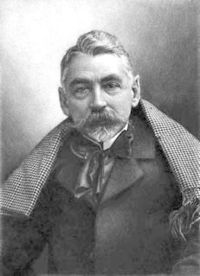
Mallarme to Degas: “Poems have to do with words, not ideas.”
If words are like music notes, how is a poem written?
Consider a word: its meaning, etymology,size, shape, sound, color, rhythm, effect, strength, and weakness. How does a word look on a page? How does it move and sound in space, appear and disappear; how does it jam and set apart from others?
If words are like music notes, then poems may be written not for their connection of things or feelings. Meanings would have to be derived from the synthesis of sound, with each word contributing to their shades and dynamics. Reading a poem would be an active production of sound instead of someone sitting quietly in a chair leafing through a book—imagine an audience leafing through a music score in the absence of an orchestra.
Words—alive in all possibilities, with poetry their vessel.

Nice to see M. Mallarmé’s photo in your blog!
Interestingly, Poe was the great poet for Mallarmé, as he was for Baudelaire. It was in his sonnet to Poe that Mallarmé formulated his most famous commentary on the poet’s activity: not to express “himself” but “donner un sens plus pur aux mots de la tribu,” “to give a purer sense to the words of the tribe.” “The pure work,” wrote Mallarmé, “implies the disappearance of the poet as speaker, yielding his initiative to words….”
THE TOMB OF EDGAR POE
Eternity changes him into Himself at last
The Poet arises with a naked sword
His century terrified that this strange voice was captured by death’s blast,
Stunned that it never knew his word!
They, like a vile hydra awakening as the angel
Gave a purer sense to the words of the tribe,
In the dishonored wave of the black mélange
They drank, loudly proclaiming the sortilege they imbibed.
From hostile soil and cloud, here’s grief.
If our Idea fails to sculpt a bas-relief
To ornament the dazzling tomb of Poe,
—This calm block fallen from disastrous dark and woe—
May this granite at least display his ways
Forever, to the black flights of Blasphemy ravening future days.
Stéphane Mallarmé (1876)
*
All thought emits a throw of the dice.
I think this wonderful passage from Charles Sanders Peirce’s essay, “The Doctrine of Chances” (1878), is very close to the Mallarmé of “Un Coup de Dés” (1897):
It is an indubitable result of the theory of probabilities that every gambler, if he continues long enough, must ultimately be ruined. Suppose he tries the martingale, which some believe infallible, and which is, as I am informed, disallowed in the gambling-houses. In this method of playing, he first bets say $1; if he loses it he bets $2; if he loses that he bets $4; if he loses that he bets $8; if he then gains he has lost 1 + 2 + 4 =7, and he has gained $1 more; and no matter how many bets he loses, the first one he gains will make him $1 richer than he was in the beginning. In that way, he will probably gain at first; but, at last, the time will come when the run of luck is so against him that he will not have money enough to double, and must, therefore, let his bet go. This will probably happen before he has won as much as he had in the first place, so that this run against him will leave him poorer than he began; some time or other it will be sure to happen. It is true that there is always a possibility of his winning any sum the bank can pay, and we thus come upon a celebrated paradox that, though he is certain to be ruined, the value of his expectation calculated according to the usual rules (which omit this consideration) is large. But, whether a gambler plays in this way or any other, the same thing is true, namely, that if he plays long enough he will be sure some time to have such a run against him as to exhaust his entire fortune. The same thing is true of an insurance company. Let the directors take the utmost pains to be independent of great conflagrations and pestilences, their actuaries can tell them that, according to the doctrine of chances, the time must come, at last, when their losses will bring them to a stop. They may tide over such a crisis by extraordinary means, but then they will start again in a weakened state, and the same thing will happen again all the sooner. An actuary might be inclined to deny this, because he knows that the expectation of the company is large, or perhaps (neglecting the interest upon money) is infinite. But calculations of expectations leave out of account the circumstance now under consideration, which reverses the whole thing. However, I must not be understood as saying that insurance is on this account unsound, more than other kinds of business. All human affairs rest upon probabilities, and the same thing is true everywhere. If man were immortal he could be perfectly sure of seeing the day when everything in which he trusted should betray his trust, and, in short, of coming eventually to hopeless misery. He would break down, at last, as every good fortune, as every dynasty, as every civilization does. In place of this we have death.